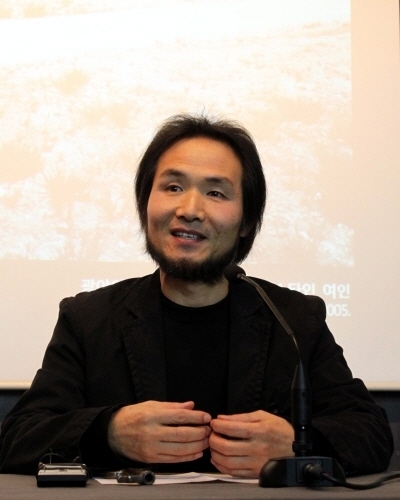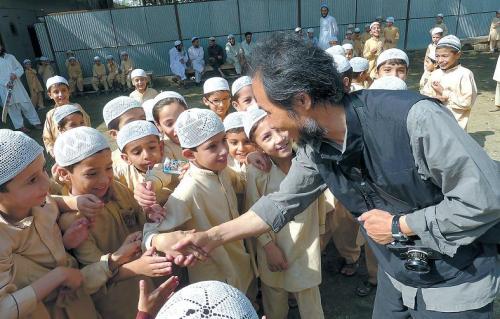Activist Park No-hae aims to spread peace throughout the world
On a recent trip to Pakistan, poet and photographer Park No-hae met a young man who had been shot near the troubled Afghan border.
Wondering why a foreigner would be traveling through the conflict-ridden region, the wounded Pakistani local asked him: “Aren’t you afraid of death in this battlefield?”
On a recent trip to Pakistan, poet and photographer Park No-hae met a young man who had been shot near the troubled Afghan border.
Wondering why a foreigner would be traveling through the conflict-ridden region, the wounded Pakistani local asked him: “Aren’t you afraid of death in this battlefield?”

And now, Park has answered with a poem: “I am afraid of dying when I am in love, but I am afraid of living without love. Love is more powerful than death.”
So reads the inscription displayed alongside the stark black and white images of Pakistan’s northern tribal areas at the activist-poet’s third photographic exhibition.

The “Village Where Clouds Stay” exhibition is running at the new Ra gallery in Seoul, recently opened by the NANUMMUNHWA peace-building organization, which Park founded 12 years ago.
And it is love that has inspired Park to cross the world during the past decade to meet people in Palestine, Lebanon, Kurdistan, Sudan and Myanmar, NANUMMUNHWA secretary general Im Sohee explained.
Park had previously worked as a labor activist during Korea’s years of dictatorship, publishing his first book of poems “Dawn of Labor” in 1984. Nearly 1 million copies were printed despite a government ban, but such acts caused Park to be targeted by the military government.
He became known as the “faceless poet” and a symbolic protest figure. He was imprisoned for more than seven years up to 1998 for his campaigns.
While he traveled on his release, he witnessed mass protests across Europe when the Kurdish leader Abdullah Ocalan was arrested. He decided to work for world peace and justice, with a special focus on the Middle East and Asia.
As Park crossed many borders, he began to feel that language barriers were rendering his poems useless as a means to spread his message. So, he began carrying an old camera instead of a fountain pen.
“Park No-hae felt that what the weak needed was a camera and what the occupiers and dictators were afraid of was a camera,” Sohee explained.
His latest exhibition is running at NANUMMUNHWA’s new Ra gallery in Booamdong, Seoul, from April 16 to June 27 from 11 a.m.-11 p.m. every day except Thursdays, when special weekly seminars are held in Korean.
One powerful image on display shows a man and woman working outside their hovel-like abode in Pakistan’s Nasirabad Village. Another shows students taking a class on a mountainside with no equipment save some chairs and a blackboard under the open sky.
But Park’s images do not aim to shock, said Sohee. Rather, he wishes to portray ordinary people as they go about their daily lives ― farming, praying or drinking tea.
“This exhibition aims to show some kind of respect to innocent people and victims living in border areas ― their extreme patience against war and appreciate how they never lose the spirit of friendship and hospitality in times of crisis when hope is disappearing,” she added. “We want to show these aspects to the younger generation in Korea.”
Once the exhibition has ended, the photographs will be sold to raise money for global peace sharing activities.
During his visit to Pakistan in late 2011, Park supported the villagers he met to help them rebuild their old houses, schools and local hospitals on behalf of NANUMMUNHWA supporters. The organization has never received government or funding from large corporations, but raises all revenue through donations from its 2,500 members.
“Ever since Park’s excursion to Pakistan, we are trying to restore traditional small towns by establishing small schools and local hospitals to serve people there to help them become self sufficient and independent,” Sohee said.
“More importantly, members and students of our organization are engaging, sharing and learning how to transform information into specific knowledge, encouraging society to demystify the vicious circle of societal problems.”
Some of NANUMMUNHWA’s other wide-ranging activities include a school in a Palestinian refugee camp in Lebanon and organic farms in Myanmar shanty towns. In Korea, NANUMMUNHWA leads a creative social movement for university students here. It also runs a Nanum farmers’ program near Seoul, and operates weekend schools for marginalized children. Their activities include farming and reading classical texts, as well as organizing forums and an academy on current social issues.
For more information on NANUMMUNHWA, visit to www.nanum.com and www.racafe.kr.
By Kirsty Taylor (kirstyt@heraldcorp.com)
-
Articles by Korea Herald


![[AtoZ into Korean mind] Humor in Korea: Navigating the line between what's funny and not](http://res.heraldm.com/phpwas/restmb_idxmake.php?idx=644&simg=/content/image/2024/04/22/20240422050642_0.jpg&u=)
![[Exclusive] Korean military set to ban iPhones over 'security' concerns](http://res.heraldm.com/phpwas/restmb_idxmake.php?idx=644&simg=/content/image/2024/04/23/20240423050599_0.jpg&u=20240423183955)



![[Graphic News] 77% of young Koreans still financially dependent](http://res.heraldm.com/phpwas/restmb_idxmake.php?idx=644&simg=/content/image/2024/04/22/20240422050762_0.gif&u=)
![[Herald Interview] Why Toss invited hackers to penetrate its system](http://res.heraldm.com/phpwas/restmb_idxmake.php?idx=644&simg=/content/image/2024/04/22/20240422050569_0.jpg&u=20240422150649)






![[Exclusive] Korean military to ban iPhones over security issues](http://res.heraldm.com/phpwas/restmb_idxmake.php?idx=652&simg=/content/image/2024/04/23/20240423050599_0.jpg&u=20240423183955)



![[Today’s K-pop] Ateez confirms US tour details](http://res.heraldm.com/phpwas/restmb_idxmake.php?idx=642&simg=/content/image/2024/04/23/20240423050700_0.jpg&u=)